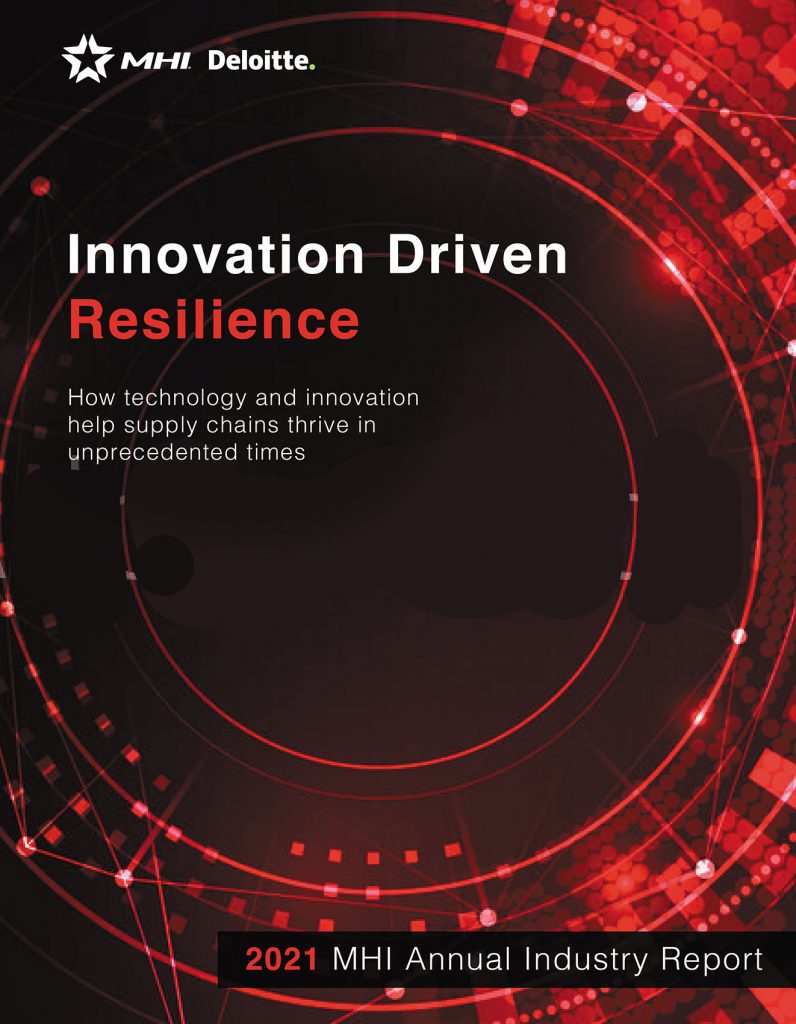
The eighth edition of the MHI Annual Industry Reportconnects investment in digital technology to supply chain organizations’ ability to respond, recover and thrive amid disruption.
By Carol Miller
Historically, supply chains have been built for efficiency. Having a Lean, just-in-time, cost effective manufacturing or distribution supply chain was a point of pride for many chief supply chain officers (CSCOs). Unfortunately—as the world learned in 2020—that model isn’t the most resilient when it comes to unforeseen disruptions. Rather, many organizations found their supply chain vulnerabilities exposed as personnel scrambled to manage cascading operational fallouts in the face of an unprecedented global crisis.
Yet some companies were able to flexibly respond, quickly recover and subsequently thrive amid the pandemic; they’ve since emerged even stronger and more competitive than ever before.
“The most resilient organizations, in fact, were those that had made investments in digital technologies—particularly the ones we’ve been studying in the MHI Annual Industry Report over the past eight years—prior to the pandemic,” said John Paxton, CEO of MHI. “These companies were more prepared and therefore able to adapt, survive and even thrive during this disruption. They’re also the most likely to be ready for, and ahead of, the next crisis.”
Indeed, the overarching theme of the Deloitte Consulting LLP-researched 2021 MHI Annual Industry Report: Innovation Driven Resilience was how supply chain organizations harnessed the power of digital technologies and innovations to respond, recover and thrive during the pandemic-driven turmoil of 2020. That assessment was also at the center of the ProMatDX keynote panel discussion that reviewed the report, which can be viewed at promatshow.com/sessions/keynotes.

Paxton moderated the keynote along with Thomas Boykin, a leader of Deloitte Consulting’s supply chain network optimization practice and lead researcher, for the past eight years, of the MHI Annual Industry Report. The pair was joined by Randy V. Bradley, associate professor of information systems and supply chain management in the Haslam College of Business at The University of Tennessee, and Annette Danek-Akey, executive vice president of supply chain at Penguin Random House. Bradley and Danek-Akey provided additional insights and perspective on the report’s highlights and findings.
“Because our industry is incredibly dynamic, and with the continuous challenges supply chain leaders face, MHI believes it is very important to produce this report year-over-year to offer perspective on how companies are responding to those shifts,” Paxton explained. “We want to learn and share what’s important to the industry from a technology point of view, and from a business and workforce perspective. The report shows how trends are developing in each area.”
It’s also important, he added, for the report to provide actionable steps leaders can take as their organizations progress down their own digital supply chain paths: “For that reason, we continue to include case studies as examples of how organizations have successfully applied innovative technologies to tackle challenges, then conclude each report with a list of recommendations for next steps that leaders should consider.”
 MHI Solutions Improving Supply Chain Performance
MHI Solutions Improving Supply Chain Performance